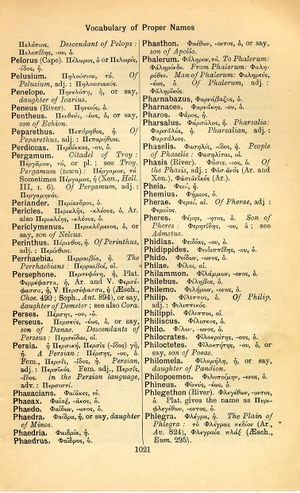Philoctetes: Difference between revisions
From LSJ
ὕπνος δεινὸν ἀνθρώποις κακόν → sleep is a terrible evil for humans (Menander, Sententiae monostichoi 1.523)
(Names) |
(D_7) |
||
| Line 1: | Line 1: | ||
{{WoodhouseENELnames | {{WoodhouseENELnames | ||
|Text=[[File:woodhouse_1021.jpg|thumb|link={{filepath:woodhouse_1021.jpg}}]]Φιλοκτήτης, -ου, ὁ, or say, <b class="b2">son of Poeas.</b> | |Text=[[File:woodhouse_1021.jpg|thumb|link={{filepath:woodhouse_1021.jpg}}]]Φιλοκτήτης, -ου, ὁ, or say, <b class="b2">son of Poeas.</b> | ||
}} | |||
{{Gaffiot | |||
|gf=<b>Phĭloctētēs</b>¹⁶ <b>(-ta)</b>, æ, m. (Φιλοκτήτης), Philoctète [héritier de l’arc et des flèches d’Hercule, abandonné dans l’île de [[Lemnos]] à cause d’une blessure fétide] : Cic. Tusc. 2, 19 ; Fato 37 || <b>-tæus</b>, a, um, de Philoctète : Cic. Fin. 2, 94. | |||
}} | }} | ||
Revision as of 07:00, 14 August 2017
English > Greek (Woodhouse)
Φιλοκτήτης, -ου, ὁ, or say, son of Poeas.
Latin > French (Gaffiot 2016)
Phĭloctētēs¹⁶ (-ta), æ, m. (Φιλοκτήτης), Philoctète [héritier de l’arc et des flèches d’Hercule, abandonné dans l’île de Lemnos à cause d’une blessure fétide] : Cic. Tusc. 2, 19 ; Fato 37

